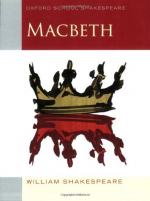|
|
Macbeth Act 3, Scene 4
Macbeth, Lady Macbeth, Lennox, Ross, and other lords and attendants are at the banquet in Macbeth's palace. Rather than sit at his place at the head of the table, Macbeth insists to sit among the lords while his wife sits on the dais. Macbeth bids the lords to seat themselves and insists that Lady Macbeth welcome their guests with a speech. She tells Macbeth to welcome them for her and he says that her heart welcomes them and their hearts return thanks for the welcome. He is too distracted to give a prolonged speech because one of the murderers has appeared in the doorway. He tells the lords that in a moment they will all drink together and then he walks to the doorway to talk with the murderer.
Macbeth is satisfied to see the blood on the murderer's face and learn that Banquo is dead. He believes that he can take care of Fleance in time, so he is not worried about the young man now. He tells the murderer that they will meet tomorrow. Lady Macbeth warns her husband that his lack of hospitality is ruining the banquet. She tells him that if the lords had wanted only to eat a meal, they could have stayed home to do that. They have joined him in the feast for his hospitality and the company of a host.
Rejoining the lords at dinner, Macbeth mentions that he wishes that Banquo were with them as he promised he would be. Lennox invites the king to sit with them, but Macbeth looks around the table and does not see an empty seat. Banquo's ghost is in the seat reserved for the king, and Macbeth doesn't realize that it is a ghost until Lennox again points to the seat as being empty. Macbeth asks who has brought the ghost and says that they cannot say that he did anything. He rambles on at the ghost while Lady Macbeth tries to play off his mutterings as a common illness that he has. She attempts to convince the lords that it is just a spell that will pass, telling them to wait only a moment and the king will be himself again. Then she tries to snap Macbeth out of his guilt-ridden panic so that he will not give them both away to the lords. She tells him that he acts like he is frightened by a superstitious ghost story. Macbeth rants on about the dead returning from their graves for only a moment more and then the ghost disappears. Macbeth is still bothered by the ghost and his own guilt, but Lady Macbeth convinces him to go back to the table with the lords and play off his outburst as an illness.
Macbeth resumes the feast and is explaining his illness to the lords when the ghost re-appears at the banquet. Macbeth speaks again to the ghost telling it to return to the grave and bother him no longer. The ghost vanishes again and Lady Macbeth tells her husband that he has ruined the light mood of their banquet. Looking at her composure he tells her that it disturbs him that she could look upon such sights (the ghosts of the people they have murdered) and maintain her composure while he is so afraid. When the lords begin to question Macbeth about what sights he means, Lady Macbeth sends them all away because she claims that her husband's health is deteriorating and their questions will only make his illness worse. The thanes leave Macbeth and his wife.
When they are alone, Macbeth tells his wife that the blood that has been shed at their hands will be avenged and their guilt will be discovered. Then he tells her that Macduff refused the invitation to dinner and he's not sure how to take the rebuff. He plans to send another invitation to Macduff tomorrow and also to visit the three witches to find out what his future is. He wants to know his fate, be it good or bad. He has schemes in his head that must be enacted before he is able to think too long on them and see the wrongness of his actions. Lady Macbeth tells him that what he needs more than anything else is sleep. He agrees that he needs rest because he has not rested well. The guilt of his actions keeps him awake because he is not yet an accomplished enough murderer to be able to ignore his conscience. They go to bed.




